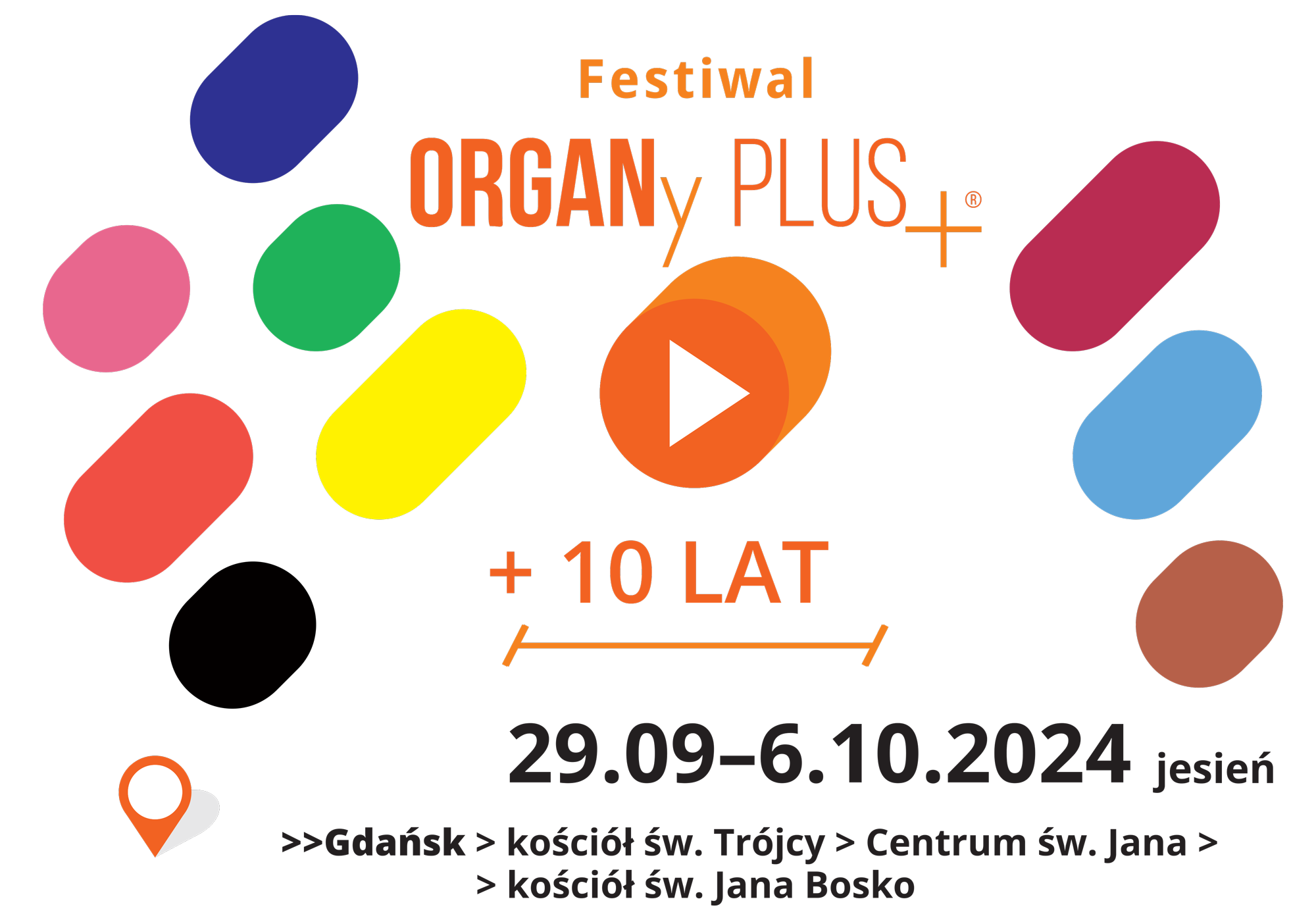
Idea
ORGANy PLUS+® Festival 2024 – PLURIMOS ANNOS!!!
Thus, ten years with the ORGANy PLUS+® festival becomes a reality. Amidst countless organ events in Gdańsk, Pomerania, Poland, and worldwide, our Festival has become one of the leading stages presenting lively, new, and profound interpretations of early music, where organs play a significant role. It’s hard to believe, but ten years of the ORGANy PLUS+® festival means 90 original concerts with the participation of 905 artists from 24 countries, including 32 debuts and 48 music premieres, courses, discussion panels, and lectures. In short, we’ve managed to create an international format in Gdańsk, which is not only attractive to music lovers and art students but also allows artists from many countries to realize their creative dreams.
This wouldn’t have been possible without the wonderful instruments that have been reconstructed in Gdańsk churches in recent years and the kindness of many parishes, orders, and institutions, led by the Gdańsk Franciscans. Thank you! It also wouldn’t have been possible without our faithful audience, whose numerous presence confirms that the idea of creating concerts as unique time capsules transporting us to a specific place and epoch is an exceptionally attractive formula for experiencing art. Thank you!! Finally, this wouldn’t have been possible without the participation of three grant providers – the Ministry of Culture and National Heritage, the City of Gdańsk, and the Pomeranian Voivodeship Government. These institutions have financially supported this innovative, bold, and crazy idea from the first edition, which turned out to be highly successful and needed. Thank you!!!
In the jubilee year of 2024, one hundred and forty artists from six European countries will present works by thirty-two composers during eleven thematic concerts, many of which will be performed not only for the first time in Poland but also worldwide.
We have returned to the traditional two editions – spring and autumn. During the spring edition, the guiding theme was MODERNA. We demonstrated how creatively historical organs could be used to perform music created recently, even live. The autumn edition will be full of PREMIERES.
Lovers of old Gdańsk culture will have a unique opportunity to engage with the works of composers active on the banks of the Motława, and the second guiding theme of the autumn edition will be old German music.
We will start the autumn edition of the ORGANy PLUS+® 2024 festival with a performance by the vocal-instrumental ensemble Wrocław Baroque Ensemble in an international line-up under the direction of Andrzej Kosendiak, who has never performed in Gdańsk before. They are winners of many phonographic awards, performing in many European countries, specializing in presenting little-known 17th-century music repertoire from Central Europe. Along with the musicians from Wrocław comes one of the most beautifully emerging stars of early music – the Spanish soprano Alicia Amo, who is already delighting music lovers with her voice on the most important opera stages in Europe. The artists are coming to Gdańsk with Gdańsk music… During the concert under the simple name + FÖRSTER, we will hear the highly elaborate compositions of one of the greatest 17th-century European composers and simultaneously the chapel master of St. Mary’s Church – the Gdańsk native Kaspar Förster the Younger. His Cantiones Sacrae will be complemented by two works – the chamber sacred concert Jephte by Giacomo Carissimi and the world premiere of a composition by another Gdańsk chapel master from the early seventeenth century – Daniel Jacobi, prepared especially for the Gdańsk ORGANy PLUS+® 2024 festival. All this will be heard from the only lectern in Poland in the Franciscan Church of St. Trinity on Sunday, September 29 at 4:00 PM. This is the first „Gdańsk” motif of the autumn edition, which should not be missed by lovers of the culture of the „Pearl in the Crown” of the First Republic.
After the unique Sunday feast with Gdańsk music at the ORGANy PLUS+® 2024 festival, we are in for another „course” from the menu of Gdańsk jewels. Born in Zgorzelec, Johann Gottlob Harrer was the successor of Johann Sebastian Bach as chapel master at St. Thomas Church in Leipzig. He composed a vast amount of instrumental and vocal-instrumental music. During his lifetime, he was undoubtedly more recognizable in Europe than his predecessor. He never visited Gdańsk, but his fame reached here, and with it, his works. The music collections of the Gdańsk Library house one of the two manuscripts of Harrer’s famous passion (the other is in Leipzig), which was probably performed in the city on the Motława in the second half of the 18th century. After three hundred years, the Leipzig ensemble Gellert Ensemble under the leadership of its leader Andreas Mitschke, along with fantastic soloists, will remind the residents of Gdańsk of this extraordinary work during the concert titled + PASSIO CHRISTI, which will take place on Wednesday, October 2 in the presbytery of the Franciscan Church of St. Trinity at 7:00 PM, thanks in part to the support of the Foundation for Polish-German Cooperation. This will be the only opportunity in Poland to acquaint oneself with this excellent composition. Once again, it should not be missed by enthusiasts of our city’s culture, but also those who want to venture beyond the music of Bach, Telemann, or Handel and see how colorful and interesting European musical life was in the 18th century.
„…Cymbalistów było wielu, ale żaden nie śmiał zagrać przy Jankielu…” – we all know this famous excerpt from Adam Mickiewicz’s Pan Tadeusz. Today, writing about cymbals seems a bit exotic, but it didn’t just come from the poet’s imagination… Did you know that in the 18th century, one of the most popular instruments, almost like a modern keyboard, were the large chromatic cymbals, cleverly named Pantaleon? Not only dance and popular music were performed on them, but also serious compositions originally written for this instrument, as well as transcriptions of music for keyboard and plucked instruments. During Bach’s time at the Dresden court of the Polish king, the best-paid musician was… a cymbalist. And the Leipzig master certainly became acquainted with this practice during his visits to the Saxon capital. Such concerts were held only in the music halls of royal or ducal courts. We want more people to have the opportunity to hear this instrument, so we invite you to the concert titled + PANTALEON at Saint Anne’s Chapel near the Church of St. Trinity on Thursday, October 3, exceptionally at 8:00 PM. We will recreate such a concert on cymbals again, thanks to the support of the Foundation for Polish-German Cooperation. The German duo La Gioia Armonica, consisting of Jürgen Banholzer on organ and Margit Übellacker on pantaleon, are currently the only artists in Europe who present professional music for cymbals. For our music lovers, they have prepared a special treat, a program composed of Bach’s works arranged just as it might have been in the 18th century.
Since the neo-Romantic organs of Eduard Wittek at the Salesian Church in Orunia were reconstructed and restored to their original sound shape, we have been trying to showcase this heritage of Gdańsk’s musical culture at the ORGANy PLUS+® festival. The turn of the 19th and 20th centuries was very intense in organ music and abounded in completely new stylistic proposals. During the concert titled + BIBLICAL SONGS on Friday, October 4 at 7:30 PM at the parish church of St. John Bosco in Gdańsk Orunia, we will hear two artists from Belgium, organist Peter Van de Velde and mezzo-soprano Anastasiia Staroselska of Ukrainian roots. The musicians have prepared a special program for our Festival dedicated to the Psalms of David, which were developed in a neo-Romantic style in various European countries. We will hear English, Polish, and Ukrainian songs. Some of them – for the first time. At our festival, we already have a small tradition of vocal art in this charming church, and we know that its original two-hundred-year-old acoustics and small size are perfect for presenting such refined chamber repertoire. Music lovers wanting to experience romantic emotions should quickly reserve this evening, as the excellent artists supported by the Belgium Embassy and the representation of Flanders will perform in Poland only once – at our festival.
The penultimate concert of the ORGANy PLUS+® 2024 festival will be dedicated to Gdańsk music. Johann Daniel Pucklitz is a name that should already be known to all who are interested in the musical culture of old Gdańsk. Last year’s performance of his Oratorio Secondo at the Gdańsk Shakespeare Theatre attracted hundreds of music lovers and was enthusiastically reviewed in Poland and abroad, and the recording of this composition won one of the most important European music awards – Opus Klassik in 2022. So it’s time to present other works that have survived in the collections of the Gdańsk Library, and there are quite a few. The performance lineup is the best possible – well-known to Gdańsk music lovers and recognized by critics – Sidonie Gudrun Otto (Germany) – soprano, Elvira Bill (Germany) – alto, Georg Poplutz (Germany) – tenor, Thilo Dahlmann (Germany) – bass, Andrzej Szadejko – conductor, artistic director, and Gdańsk ensembles Goldberg Baroque Ensemble and Goldberg Vocal Ensemble. The concert program + PUCKLITZ includes premieres of two masses and four cantatas by the Gdańsk composer. This time, it will be in the space where this music sounded for the first time three hundred years ago, which is now the Saint John’s Centre on Saturday, October 5 at 7:00 PM. This will be an entirely unique experience not only for the audience but also for the musicians. The Festival’s time capsule will transport us to the 1750s, a time when Gdańsk still enjoyed the fame of being the largest and most diverse cultural center on the Baltic. The partner of this concert will also be the Foundation for Polish-German Cooperation.
It has become a festival tradition that the last concert is a sort of „release,” a coda that allows us to recall all the aesthetic experiences of the previous concerts and summarize the festival impressions. This year, for the final concert of the ORGANy PLUS+® 2024 festival, we invited one of the most interesting mid-generation musicians-researchers of early European musical culture – Dalibor Miklavčič from Slovenia, who will present the Renaissance and early Baroque music he is discovering from the Adriatic region, where Italian, German, Austrian, and Balkan influences mingled. This very interesting mix will sound at the concert titled + DOLAR vs WECKMANN on Sunday, October 6 at the Franciscan Church of St. Trinity at 4:00 PM. The distinguished Slovenian organist will be accompanied by well-known and beloved members of the Gdańsk ensemble Tubicinatores Gedanenses – Paweł Hulisz and Filip Pysz on Baroque trumpets and on timpani – Paweł Szewczyk. The counterpoint to the newly discovered and unknown but highly ceremonial music of Johannes Batista Dolar or Jacobus Gallus Carniolus will be the organ works of Matthias Weckmann, one of the most important 17th-century composers of organ music in Europe. In this way, on the 350th anniversary of his death, we want to remember the figure of an outstanding artist who, along with Johann Froberger, had a tremendous influence on the development of keyboard music.
World-renowned performers, original old instruments, ancient performance techniques, the unchanged acoustics of the Gothic Church of St. Trinity and the neo-Gothic Church of St. John Bosco for centuries, the reconstructed interiors of the Saint John’s Centre, and the thoroughly modern interior of the Church of the Body of God, the original placement of musicians on the only Lectorium in Poland, and finally, music heard nowhere else in Poland will make us participants in musical events from centuries ago and even witnesses to entirely new musical events.
Let’s indulge ourselves in this extraordinary journey through time!
Welcome to Gdańsk! Welcome to the Church of St. Trinity, St. John Bosco, the Body of God, and Saint John’s Centre!
Prof. Dr. hab. Andrzej Szadejko
Artistic Director of the ORGANy PLUS+® Festival
Director
ANDRZEJ MIKOŁAJ SZADEJKO
Born in Gdansk in 1974. Organist, composer, conductor, teacher and organologist. Studied at the Music Academy in Gdańsk (1994-96). Graduated in 1998 from Academy of Music in Warsaw by Joachim Grubich and in 2002 in Schola Cantorum Basiliensis in Basel by Jean-Claude Zehnder where he recived diplomas with honour in organ music. He also graduated with honours in singing by Richard Lewitt and composition by Rudolf Lutz. Other important teachers were Andrea Marcon (harpsichord) and Gottfried Bach (basso continuo). In the years 1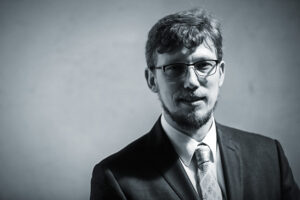 992-2002 took part in over 30 organ, harpsichord and pianoforte master classes and interpretations courses in Poland, Germany, Switzerland and Netherland. In 2021 become professor of arts. Since 2006 he has been teaching organ and basso continuo in Gdansk Music Academy, Poland. He was visiting professor giving lectures, masterclasses and workshops in Poland, Germany, Finland, Lithuania and USA.
992-2002 took part in over 30 organ, harpsichord and pianoforte master classes and interpretations courses in Poland, Germany, Switzerland and Netherland. In 2021 become professor of arts. Since 2006 he has been teaching organ and basso continuo in Gdansk Music Academy, Poland. He was visiting professor giving lectures, masterclasses and workshops in Poland, Germany, Finland, Lithuania and USA.
He is the finalist and prizewinner of many International Organ Competitions (Rumia/PL, Gdansk/PL, Warsaw/PL, Odense/DK, Brugge/B). Stipendist/scholar of many institutions: Mayor of City Gdansk/PL, Marshal of Pomerania voivodship/PL, Polish Culture Foundation/PL, City of Basel/CH, Doms-Stiftung/CH, Organ Summer Academy in Harlem/NL, Polish Institut of Music and Dance IMiT/PL, Adam Mickiewicz Institut/PL.
Since 1994 over 600 concerts in Poland, most of the European countries, Russia and USA.
Leader, adviser and organ expert in many projects of historical and modern organs, i.e. Merten Friese organ (1618) in Trinity church in Gdańsk/PL, Johann Rhode organ (1761) in St. John’s church in Gdańsk/PL, Eduard Wittek organ (1911) in Orunia/PL, Januszkiewicz & Kalnins organ (2022) in Vilnius/LT.
Since 2008 artistic director of the Project at the Polish Science Academy Bibliotheque of Gdansk – Musical Heritage of City Gdansk – reediting and recording of musical historical manuscripts from bibliotheques of Gdansk. Leader of GOLDBERG BAROQUE ENSEMBLE – vocal and instrumental baroque players (www.goldbergensemble.eu). Recordings (30 CDs) by polish labels DUX, SARTON, ARS SONORA, Acte Prealable and german labels MOTTETE and MDG (leader of the seria MUSICA BALTICA and GDANSK ORGAN LANDSCAPE). 2022 has got the OPUS KLASSIK AWARD.
Composer of organ, choir and chamber music. Publications in polish scientific and music editions. His thesis about organ music by two pupils of Bach – Mohrheim und Muethel has got a prize at the Fair of Scientific Books in Wroclaw/Poland in 2011.
Manager and artistic director of many musical events in Poland: festival ORGANy PLUS+ (www.organyplus.com), Koncerty dla Gdańszczan, ORUŃSKIE KONCERTY, festival Moniuszko in Churches of Warsaw. MONIUSZKO_150 – VILNIUS/BERLIN
Artists
WROCŁAW BAROQUE ENSEMBLE
+
BIOGRAPHY
ANDRZEJ KOSENDIAK
+
BIOGRAPHY
ALICIA AMO
+
BIOGRAPHY
ANDREAS MITSCHKE
+
BIOGRAPHY
DIOGO MENDES
+
BIOGRAPHY
TOBIAS HUNGER
+
BIOGRAPHY
INGA JAGER
+
BIOGRAPHY
ANNA KELLNHOFER
+
BIOGRAPHY
MARGIT ÜBELLACKER
+
BIOGRAPHY
JÜRGEN BANHOLZER
+
BIOGRAPHY
PETER VAN DE VELDE
+
BIOGRAPHY
ANASTASIIA STAROSELSKA
+
BIOGRAPHY
GOLDBERG VOCAL ENSEMBLE
+
BIOGRAPHY
GUDRUN SIDONIE OTTO
+
BIOGRAPHY
THILO DAHLMANN
+
BIOGRAPHY
GEORG POPLUTZ
+
BIOGRAPHY
ELVIRA BILL
+
BIOGRAPHY
GOLDBERG BAROQUE ENSEMBLE
+
BIOGRAPHY
PAWEŁ SZEWCZYK
+
BIOGRAPHY
FILIP PYSZ
+
BIOGRAPHY
PAWEŁ HULISZ
+
BIOGRAPHY
DALIBOR MIKLAVCIC
+
BIOGRAPHY
Our media
Places
The Holy Trinity Church
The Franciscan monastery complex is located in the Lower City, in the direct vicinity of the major tourist attractions of the Old Town of Gdańsk.
The complex stands out to view when entering Gdańsk from the south. Its flèche-topped timber roof truss is the dominating element in the southern panorama of the Old Town.
The history of the complex dates back to the 14. century and the beginnings of the Franciscans’ presence in Gdańsk. In the 16. century the post-monastery buildings used to house the famous gymnasium and the first public library. In the 19. century the complex was turned to the natural history museum. After World War II the Franciscans returned to occupy a part of the complex despite oppositions from the communist state authorities, thus closing a certain stage in the history of the site.
The Holy Trinity church is one of the three authentic shrines in Gdańsk which have survived war destruction. This Gothic hall church is made up of two sections: the triple-nave main body and the single-nave presbytery. Both sections are crossed with the choir screen dating back to 1488, which is the only one authentic structure of the type preserved in Poland. The church owes its specific acoustic properties to the Gothic vault over the main body of the church, spanning at the height of 22.65 meters and supported by 10 massive pillars set in two rows every 5 meters. The three naves are 29.1 m wide, while in length the main body of the church (50.7 m) and the presbytery add up to 82 m. The characteristic feature in the church structure is the asymmetric angle of the presbytery axis with respect to the axis of the main body of the church. The organ is installed on two adjacent balconies in the transept, i.e. the crossing of the main church body and the presbytery, on the southern side of the choir screen. There is no other architectural solution of the type in Poland, with just several similar solutions found worldwide.
Church of Saint John Bosco in Orunia
The first wooden chapel was built by the Teutonic Knights in Orunia, probably in the first half of the 15th century. In 1571 it was expanded and converted into a Lutheran church, which burned down in 1577. It was not until 1608 that the construction of a new church was started, and in 1684 a tower was added. As a result of another reconstruction, completed on June 13, 1764, the western and northern parts of the temple were expanded.
On September 3, 1813, the church was set on fire by the Russian army besieging Gdańsk. It was not until 1820, thanks to the personal and financial commitment of Hoene the trade counselor, who was the owner of large areas in Orunia, that the construction of today’s temple was started according to the design of the imperial court architect – Karl Friedrich Schinkel from Berlin. A brick neo-Gothic body of the church was created with a slender tower, topped with a sharp dome with rarely seen, „gothic” vaults made of wood and covered with a layer of plaster forming ribs and consoles supported on 8 wooden pillars supporting also a gallery running along the side walls, connecting above the entrance the main one, where the organ was later placed. The new Orunia’s church was consecrated on October 5, 1823. the owner of the area founded also the main altar, two side altars and the organ.
The church was in good shape until 1945, when the advancing Soviet army destroyed it again. However, despite the damage to the roof, tower and windows, from which traceries and stained glass fell out, the temple did not suffer as much devastation as most of the religious buildings in the city itself.
After the war, the church in Orunia was assigned to the Salesians by the bishop of Gdańsk, Karol Maria Splett, as the rector’s church, and on July 15, 1994, the church became a parish church, separating from the nearby parish in Old Scottland.
Corpus Christi parish church
Corpus Christi parish church – is a two-storey temple, including the lower church, with approx. 1,200 m2 and the upper, with approx. 2,000 m2. The modern block in the shape of a segment of a circle, which converges towards the presbytery, is covered with a roof consisting of four independent parts, covered with Swedish metal tiles. Above the presbytery there is a tower topped with an 18-metre-high cross illuminated at night, with a façade lined with aluminum panels, and granite from the base to the height of three meters, and clinker from the front. The other façades are plastered with white acrylic, and the lower part is clad with clinker bricks. Two huge window areas in the side walls of the upper church with a total area of 260 m2 are framed by aluminum frames, and one of them has stained glass windows already installed.
The place of daily common prayer is the lower church. On the altar wall there is a bas-relief of the Lord Jesus. In the presbytery there is a statue of the Mother of God designed and made by Krystyna Kręcicka, also the author of the Stations of the Cross. There are side altars on the right; from the back: first – with images of St. Padre Pio and the relics of St. Maximilian M. Kolbe and the figure of St. Francis of Assisi; Faustina, the fourth – Our Lady of Perpetual Help with the titular image and the figure of St. Joseph and the last one, by the presbytery – with images of Bl. Fr. Jerzy Popiełuszko and Bl. John Paul II. In the lower storey there are also: the chapel of St. Adalbert with the papal altar and the so-called side chapel.
Sunday Masses are held in the upper church, which can be entered through five doors and further through vestibules, over which the choir balcony with an area of 610 m2 dominates. Through one side door you can also enter the side chapel of the upper church, where there will be a chapel of adoration of the Blessed Sacrament. The upper church captivates with its noble elegance, harmony and peace. The special character of the presbytery, raised by several steps, is emphasized by the white marble on the floor and the marble altar, pulpits, baptismal font and candlesticks. It is perfectly complemented by a light, granite floor (Cashmir gold and Cashmir white) – with a discreet mosaic pattern in the nave. The main ornament of the spacious and bright interior are huge stained glass windows, previously installed in the presbytery and the left wall of the church. Corpus Christi Church in Morena is the second largest church in the Archdiocese of Gdańsk. In addition to liturgical functions, it is an excellent venue for concerts.
St. John’s Centre in Gdańsk
The first mention of the existence of a small chapel dedicated to St. John dates back to 1358. From around 1360 to around 1546, construction of a three-aisle Gothic church in the hall style was ongoing. However, the church’s structure was externally reinforced up until the end of the eighteenth century due to unstable statics. Between 1463-1465, the church received starry vaults, and in 1612, one of the largest European stone altars, created by Abraham van den Blocke, was installed and remains to this day. Between 1680-1690, a library funded by Zachariasz Zappio was established on the northern side of the transept. In March 1945, the church burned down. The roof structure, roof, windows, and floor were destroyed, the structure was damaged, and the twin Baroque townhouses on the south wall of the chancel were also affected. After the war, the burned church building was roofed and its valuable vaults were secured. The church itself was designated as a lapidarium and was not included in the planned reconstruction of the Main Town. Most of its equipment was transferred to St. Mary’s Church in Gdańsk. The church was not taken over for religious purposes after the war and deteriorated over the years. It also served as a set for war movies, which further contributed to its decay. In 1960, the evangelical community relinquished ownership of the church, but it wasn’t until 1991 that the church was formally handed over to the Gdańsk diocese.
The Baltic Cultural Centre in Gdańsk, based on an agreement with the Archdiocese of Gdańsk, has managed the reconstruction, conservation, and adaptation of St. John’s Church into a Cultural Centre – St. John’s Centre, since 1995. The reconstruction of the Johann Rohde organs is the most significant element of the second stage of the church’s revalorization and adaptation project. It was co-financed as part of the project „Revalorization and adaptation of St. John’s Church in Gdańsk into St. John’s Centre – stage II”, within the Regional Operational Program of the Pomeranian Voivodeship for 2014-2020, co-financed by the European Regional Development Fund.
Organ
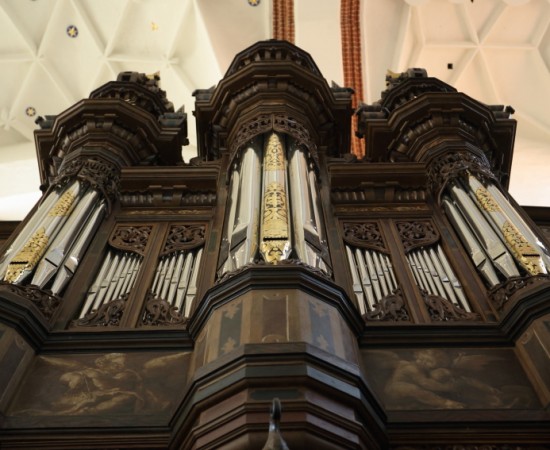
Organ of St. Trinity Church in Gdansk
Organ of St. Trinity Church in Gdansk are unique in design, architecture and music on a global scale. It is one of the most important instruments in Europe, now influencing the whole musical culture of the region. It is the only instrument of this type in Poland and in Europe.
The reconstruction of the organ at the Holy Trinity church is fundamental for the cultural development of the monastery complex.
The purpose of reconstruction of the Merten Friese’s instrument is to bring it back to its shape and style gained after the most recent modifications carried out in Baroque, i.e. in mid-18. century, by Friedrich Dalitz, an organ builder from Gdańsk.
The instrument is being recreated using organbuilding techniques and materials typical for the epoch in which it was originally built. In order to be as close to the original as possible, the recreating team used all preserved authentic elements of the organ casing. The works are based on information and documentation drawn when dismantling the instrument in the times of the Second World War. The physical form and musical potential of the recreated instrument is unmatched in Poland. Its Baroque shape refers to the tradition of organ-building characteristic for the Baltic states. The instrument become an important link in the process of reviving the craft culture of the Hanseatic circle in such cities as Hamburg, Stralsund, Copenhagen, Goeteborg, Stockholm, or Riga.
Reconstruction of the instrument so large and so important for the musical culture of the region and all Poland is unique in many respects. The uniqueness of the project, in view of the organ-building tradition in former Hanseatic cities, stems from the fact that the project concept assumes following of the process of transformations which occurred in organ building in the region over the period of 150 years.
The organ was being put back in its original place, on the railing on the southern side of the presbytery, by the choir screen. This is the only structural solution of the type found in Poland, echoing the style, rare as it is, found in the organ-building art of the Netherlands, Belgium, and northern Germany.
Thanks to the positioning of the organ in the direct vicinity of the choir screen the qualities of the interior similar to those offered by concert halls enable holding musical events for which no other church interior in Poland is suitable, at the same time giving those musical productions an additional value of following the historic musical practice.
There is no other church in Poland with a choir screen so large, able to accommodate both the choir, and orchestra and an organ nearby. Thanks to it, the potential of using the intertior of the Holy Trinity church for artistic purposes is almost unlimited.
The organ is just finished in May 2018 and already serves to liturgy and cultural events as well as educational and scientific purposes.
A brief history of the instrument
| 1616-1618 | – probably Merten Friese built the organ |
| 1697 | – adding Cimbelstern by Georg Nitrowski |
| 1703 | – Tobias Lehmann rebuilt the old instrument and built a new pedal case |
| 1757 | – barock reconstruction by Rudolph Dalitz |
| 1914 | – Total rebuilding and pneumatization by Otto Heinrichsdorf |
| 1943 | – dismantling of organ durin WWII |
| 1960 | – part reconstruction of pedal balcony and prospect with pneumatic organ behind by Ryszard Plenikowski |
| 2008 | – Begin of reconstruction of the historical barock organ by Kristian Wegscheider from Dresden with cooperation with Szymon Januszkiewicz from Niedalino |
| 2013 | – Reconstruction of the first section – Rückpositiv |
| 2015 | – the end of reconstruction of all preserved historical elements of organ cases |
| 2017 | – reconstruction of further divisions – Gross Pedal, Klein Pedal, Brustwerk |
| 2018 | – reconstruction of Hauptwerk – the end of the reconstruction project |

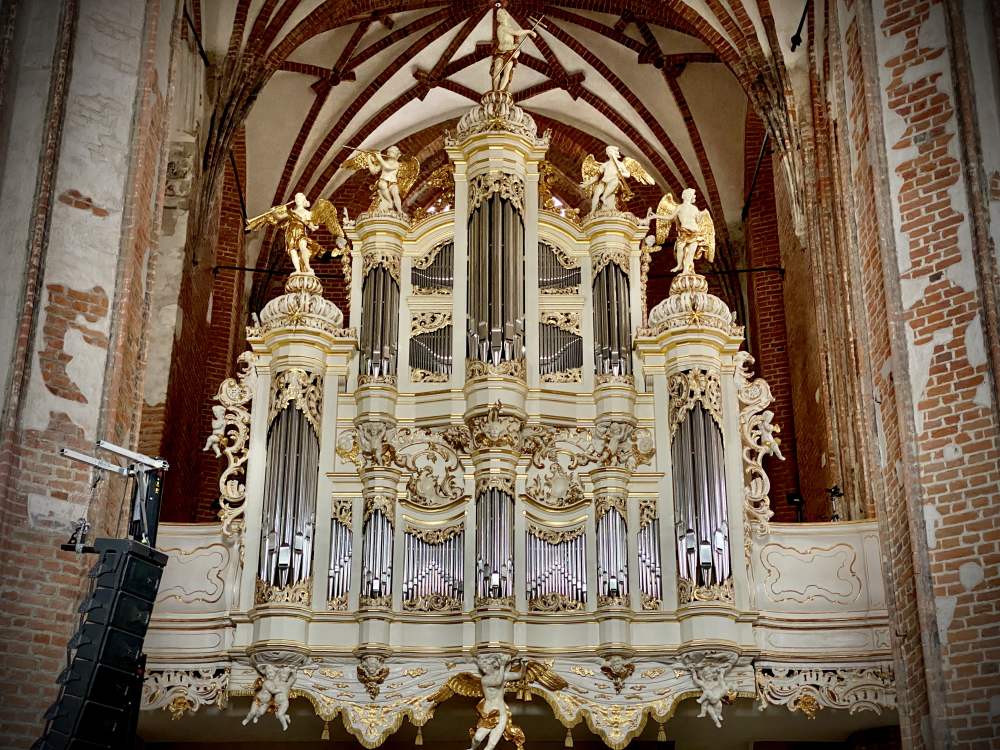
About the organ of Johann Friedrich Rhode
In 2019, 77 years later, one of the most splendid instruments of 18th-century Europe returned to its former place in a reconstructed form, whose modern technological solutions were at that time set by experts as a model for other instruments. The 30-voice instrument was originally created together with the choir in 1760-61 as the second auxiliary instrument for the great main organ, the prospect of which is now in St. Mary’s Basilica. The builder of this most modern instrument in Europe at that time was Johann Friedrich Rhode, probably a student of Andreas Hildebrandt from Gdańsk, an associate of Christian Obuch in Pomerania and Warmia, and Jonas Grena and Peter Strahl in Sweden. The beautiful carving and sculptural setting of the organ prospectus were made by Johann Heinrich Meissner, one of the most outstanding sculptors working on the Baltic Sea. Fortunately, this richly carved and gilded organ case was preserved in its entirety during the evacuation in 1943-44. However, the instrument had to be recreated. The main idea behind this realization was maximum fidelity to the original, which was achieved in almost 100% thanks to the professional work of the conservation company, Mr. Jacek Dyżewski Dart from Gdańsk and the Polish-Belgian consortium of organ-building companies Guido Schumacher from Eupen in Belgium and Szymon Januszkiewicz from Pruszcz Gdański. Intonation and tuning were entrusted to an outstanding organ builder from Latvia – Janis Kalnins. The entire project was conducted by Iwona Berent – the curator of the Church of St. John, who has been consistently managing the revitalization of the entire church for many years, and dr hab. Andrzej Szadejko – the author of research and the concept of organ reconstruction, who supervised the project and is currently the curator of the instrument.
A brief history of the lateral organs at the St. John’s church in Gdańsk
| 1560-64 | – first known side organ built in the south aisle by Hans Behrendt |
| 1642 | – Another instrument built by Michael Fischer. |
| 1688 | – side organ is moved to the northern aisle. |
| 1760-1761 | – new Johann Friedrich Rhode organ with a new choir built to replace the previous instrument. |
| 1912 | – Eduard WIttek’s new 17-voice pneumatic organ built inside the historical case |
| 1943-1944 | – disassembly of the baroque case and organ gallery |
| 1945 | – destruction of the church and pneumatic organs |
| 2017-2019 | – reconstruction of the baroque-classical organ by the consortium of Guido Schumacher and Szymon Januszkiewicz |

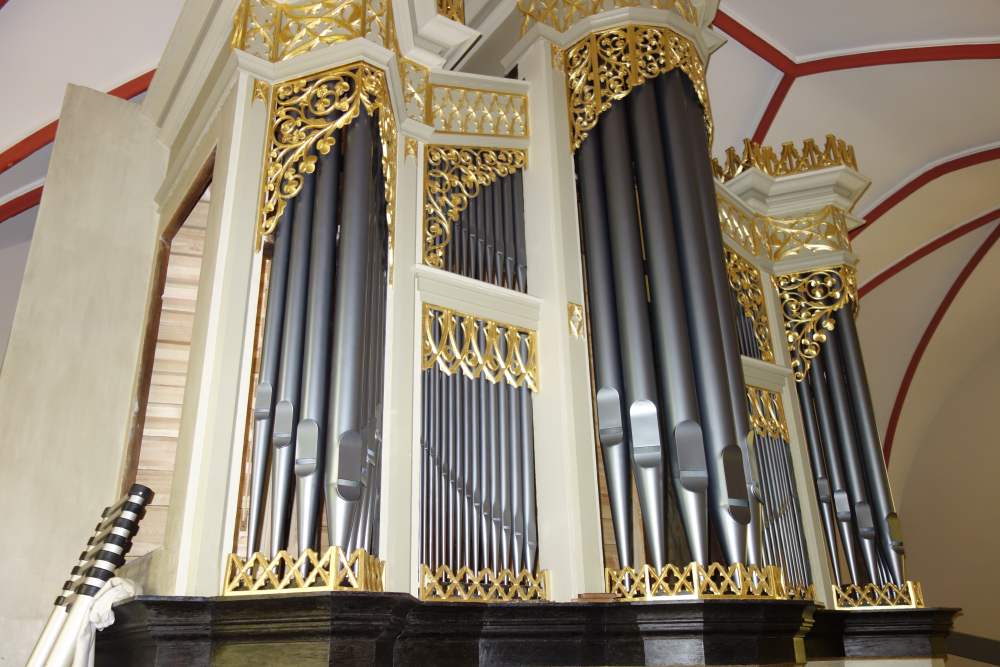
About the organ at the St. John Bosco church in Orunia
The history of the smallest festival instrument is very complicated. For a long time the original authorship of the instrument was attributed in the literature to Johann Hellwig from 1611. However, during a recent renovation, it was discovered that the mechanical 20-voice instrument was originally created in 1749 in the workshop of the famous Gdańsk organ builder – Andreas Hildebrandt for the now defunct hospital church, which was rebuilt in 1734 just outside the walls of Gdańsk. On this occasion, on June 8, 1749, during the consecration of the newly built organ, the ceremonial cantata, which has been preserved in the collection of the Gdańsk Library – Saget dank allezeit – by Johann Daniel Pucklitz, a Gdańsk composer, was performed. The church was destroyed again in 1807 by the French army, and the devastated instrument and the case were dismantled and stored by the Gdańsk organ builder, Christian Ephraim Ahrendt. In 1824, using the original elements of Hildebrandt’s organ, Ahrendt built a new instrument in the choir of the Orunia temple, visually adapting it to the neo-Gothic interior design. In the twentieth century, the instrument was rebuilt many times. First, in 1911, Eduard Wittek built a new 17-voice pneumatic organ in a baroque case, and then in 1986 Wawrzyniec Rychert, and in the 2000s, other unauthorized people partially changed the instrument’s disposition and technical parameters, leading to its devastation.
Thanks to the initiative of Father Mariusz Słomiński, the parish priest of St. John Bosco in Orunia, in 2017-18, a project was carried out to renovate and partially reconstruct the neo-romantic pneumatic organs of the Elbląg company by Eduard Wittek, funded in 1911 for the local church by the Hoene family. The program of two-year works included the renovation and conservation of the organ case and the restoration of the original, neo-romantic disposition of the instrument from over a hundred years ago. The works under the supervision of dr hab. Andrzej Szadejko were done by the organ-building company of Szymon Januszkiewicz from Pruszcz Gdański and the conservation studio of Mrs. Jolanta Pabiś-Ptak and their associates. The preservation of the organs was financially supported by the donations of parishioners and by the Ministry of Culture and National Heritage and the City of Gdańsk. Currently, it is the only stylistically homogeneous neo-romantic instrument in the whole Pomerania.
A brief history of the instrument
| 1749 | – new Andreas Hildebrandt organ in the rebuilt Lazaretkirche outside the walls of the city of Gdańsk |
| 1807 | – dismantling of the remains of the organ builder by the Gdańsk organist Christian Ephraim Ahrendt |
| 1824 | – construction of a new instrument with the use of old elements in the church in Orunia |
| 1911 | – Eduard Wittek put a new pneumatic organ in a baroque case. |
| 1986 | – Wawrzyniec Rychert rebuilds the instrument in the spirit of Orgelbewegung |
| Lata 2000 | – devastation of the instrument by self-proclaimed organ builders |
| 2017-2018 | – renovation and partial reconstruction of the Wittek organ by Szymon Januszkiewicz from Pruszcz Gdański |

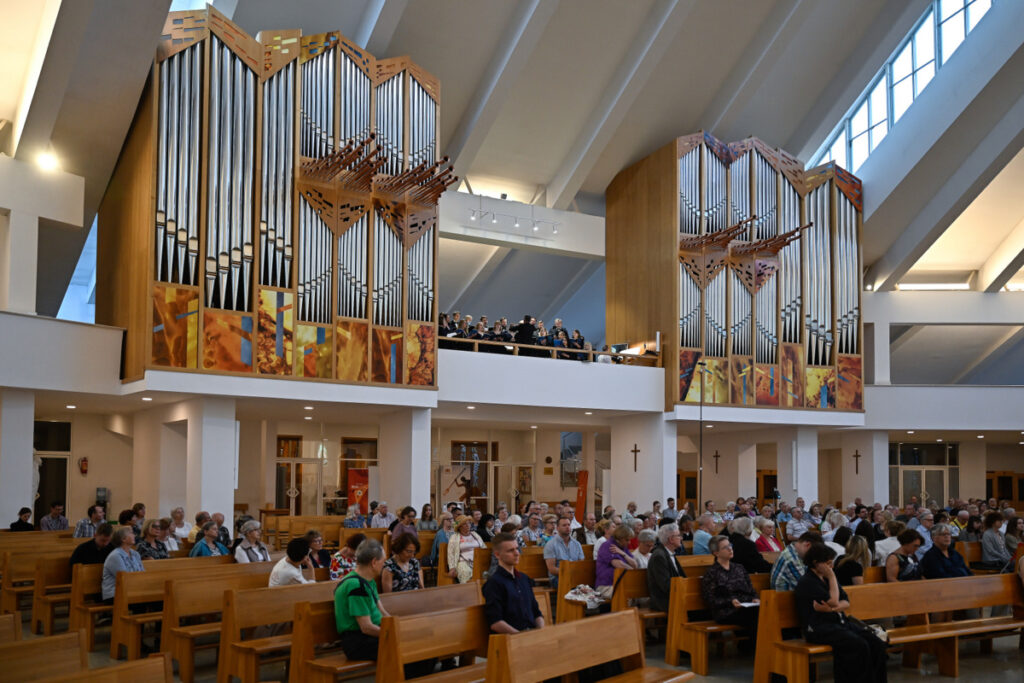
Project of the disposition of organs for the Body of Christ Church in Gdańsk-Morena
The organs were built in 2023 by the organ-making workshop of Zdzisław Mollin in Odra according to the concept of Professor Dr. hab. Bogusław Grabowski.
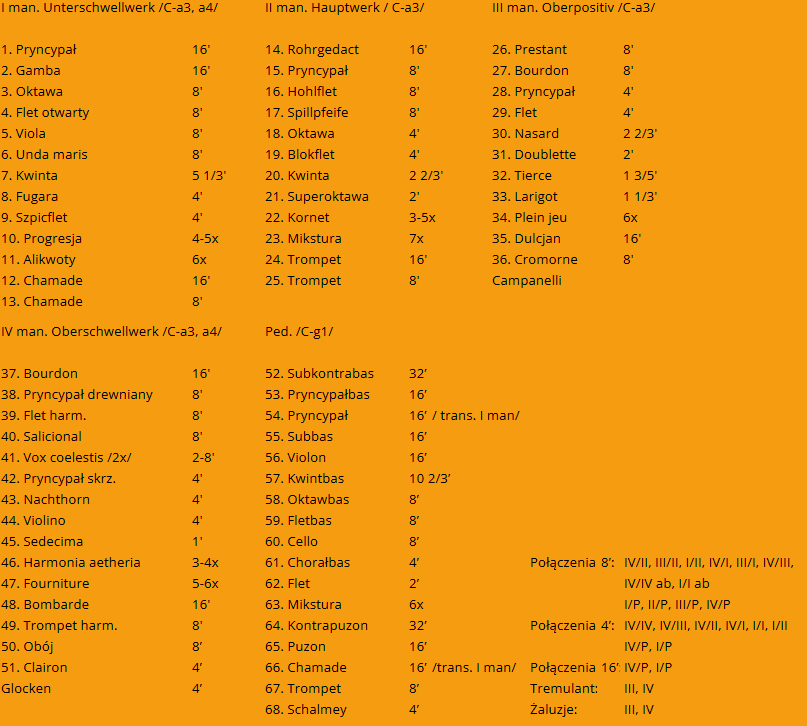
Gallery
Organization
Tickets
- 29.09 50/70 PLN
- 2.10 40/60 PLN
- 3.10 30/45 PLN
- 4.10 free entry
- 5.10 50/70 PLN
- 6.10 25/35 PLN
- season ticket 150/200 PLN
Discounted tickets are available for:
- students (with valid ID)
- holders of the Culture Card
- holders of the LARGE FAMILY CARD
- Patrons of Whistles
Free entry based on a pass issued at the concert venue is available for:
- pupils and students of art schools and universities (with valid ID)
- pensioners and retirees (with valid ID)
Tickets and passes available for purchase one hour before the concert starts (cash payment) or by e-ticket.
Contact
Stowarzyszenie Przyjaciół Kościoła Św. Trójcy „Dziedziniec” w Gdańsku
ul. Św. Trójcy 4
80-822 Gdańsk
General and Artistic Director
prof. dr hab. Andrzej Szadejko
info@organyplus.com
Office
biuro@organyplus.com
mobile phone: +48 728 376 237


Sponsors


Partners

Media

Press room
Organy PLUS+ © 2016
designed by monolight.eu
graphics by Beata Czerepak





































